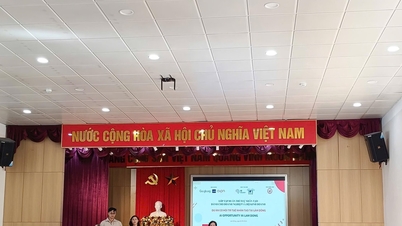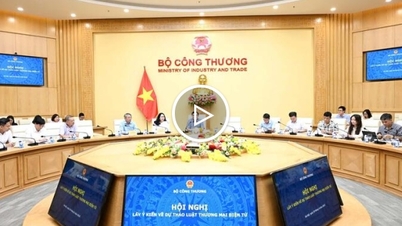Vision and historical mission
On April 2, 2024, the Prime Minister issued Decision No. 142/QD-TTg "Approving the National Data Strategy to 2030". This Decision clearly states: Data is a new resource, a key factor for national digital transformation, creating new values to promote socio -economic development, enhance national competitiveness and serve the interests of the people.
Currently, the Ministry of Public Security is developing the Data Law, the National Data Center and implementing Project 06 on National Digital Transformation to contribute to realizing the vision and historical mission that General Secretary and President To Lam stated: "Building an economic model with data as the center, taking digital transformation as the foundation, data becoming means of production, forming data products, services, data markets and data economies, bringing the country into an era of prosperity".
In reality, all businesses need data to survive and develop, and data increasingly occupies a dominant position, dominating the socio-economic landscape. Therefore, the participation of the business community in building a data economy and serving national digital transformation is necessary and urgent.
 |
| Ministry of Industry and Trade promotes the development of electronic contracts - (Photo: Contributor). |
According to the Ministry of Public Security, many countries in the world have regulations on data, operation, exploitation and use of data (data of state agencies, organizations, businesses and individuals) such as: Open Data Law (Korea); European Data Governance Law applicable to 27 member countries of the European Union; European Data Act applicable to 27 member countries of the European Union...
In Vietnam, the implementation of the Party and State's policies and guidelines on science and technology development, especially issues related to the construction, creation, connection and sharing of data, has achieved some positive results such as: Initially initiating and forming 07 national databases; some national databases have been interconnected and shared data, contributing to reforming and simplifying administrative procedures for people; technology infrastructure for building data centers has initially received more investment attention...
However, there are still many shortcomings and limitations such as: Some ministries and branches do not have or have but do not have enough infrastructure to deploy core information technology systems to serve professional work. Many databases are collected, stored in duplicate, overlapping, and inconsistent in the list of shared data, causing difficulties in connecting, sharing, and exploiting data. Investment in data centers is not synchronous, inconsistent in standards and technical regulations, and is not regularly checked, maintained, and upgraded, leading to the risk of not ensuring system security and safety.
Along with that, some ministries, branches and localities hire IT infrastructure services that pose many risks to information security because they have not really managed and controlled state data on the enterprise infrastructure. Human resources to operate and administer information systems are both lacking and weak. National databases according to Decision No. 714/QD-TTg dated May 22, 2015 of the Prime Minister have not been fully built. Many information systems still have security holes and are not qualified to connect to the National Population Database.
Difficulties in exploiting, connecting, and promptly providing data to serve administrative procedure settlement, connecting public services, statistical analysis, and providing indicators and indexes to serve the Government's direction and administration.
Building a centralized database is a common trend in countries around the world today. Therefore, the orientation of building and developing a National General Database as the main data pillar to create a foundation for the development of Digital Government, promote the digital economy and form a digital society in our country is very necessary; helping to create and form reliable and stable data systems of the State, thereby deploying connection solutions to share, reuse and develop in-depth data analysis models/applications to create many new values, new products and services and new driving forces for socio-economic development in the digital transformation period.
Investing, upgrading, expanding, and storing information in the National General Database will save a lot compared to investing in separate systems to store this information. Information stored in the National General Database will also be shared to serve the common exploitation of ministries, branches, and localities; data management agencies do not have to set up additional connection and sharing channels for information that has been added and stored in the National General Database.
Through review, there are currently 69 Laws with regulations on databases (including national databases, specialized databases), and dossiers proposing to develop laws with regulations related to data such as the 2023 Law on Electronic Transactions, the Law on Cyber Security, the Law on Network Information Security, the 2023 Law on Telecommunications, the Law on Information Technology, the dossier proposing to develop the Law on Digital Technology Industry, etc.
Through analysis and statistics in the above legal documents, these laws have stipulated 33 national databases and 39 specialized databases, specifically:
Regarding the information fields in the database: 16 databases have clearly defined information fields, 30 databases have defined but not specific information fields, and 26 databases do not define information fields.
Regarding the description and definition of databases: 34 databases have been clearly described and defined; 07 databases have regulations but not specifically; 31 databases are not defined.
Regarding the form of exploitation and sharing: 18 databases have specific regulations on the form of data exploitation and sharing; 14 databases have regulations but not specific forms of exploitation and sharing; 40 databases have no regulations.
 |
| The Department of E-commerce and Digital Economy (Ministry of Industry and Trade) has put into operation the Goods Origin Tracing Portal - (Illustration photo). |
Currently, on the basis of legal regulations and practical surveys of the Ministry of Public Security, ministries, branches and localities have deployed the construction of databases to serve state management work, including 07 national databases and nearly 100 specialized databases.
In the reviewed laws, only a few laws have provisions on the responsibilities of the Database management agency in building, collecting, managing, operating, connecting, sharing, exploiting and using information in the Database.
However, all laws do not specifically or uniformly regulate data processing and management (such as data collection, digitization, quality assurance, data storage, etc.); do not regulate the development platform and application of high technology in data processing; do not regulate the creation of databases synthesized from national databases and specialized databases to serve the work of directing and operating, planning policies, socio-economic development, reforming administrative procedures, public services, ensuring the interests of organizations and individuals; do not regulate products and services related to data that are developing in the world such as data exchanges, data intermediary services, data analysis and synthesis services, etc.
Meanwhile, establishing a data market, building and developing data-related products and services now plays a very important role. It is considered a breakthrough factor to gradually create and promote the opening of a data market, using the data market as a driving force for data development and stimulating and promoting digital transformation of industries and fields, increasing competitiveness, ensuring the digital transformation process in our country.
Resolution No. 175/NQ-CP dated October 30, 2023 of the Government approving the National Data Center Project has determined that by the fourth quarter of 2025, the National Data Center will be put into operation, serving as a place to store, synthesize, analyze, coordinate data, and provide infrastructure for ministries, branches, and localities.
Therefore, the development of a law called the Data Law is extremely important, necessary and urgent to ensure full coverage of the contents and tasks that the Government has identified in digital transformation; enhancing the effective use of information in databases to serve state management, both exploiting and applying data in socio-economic development, and tightening the management of personal and non-personal data, ensuring information security and safety.
Digital authentication is deployed with strong application
If data is the key to the digital economy, then digital authentication is the high-speed train that brings our country to participate deeply in international trade and master the global supply chain.
"Digital authentication" has been strongly applied in all economic sectors in Vietnam. From manual authentication that relies heavily on human subjective will, "Digital authentication" based on digital technology has made the economic blood vessels, goods circulation, and social administration timely respond to the explosive growth rate of the 4.0 Industrial Revolution. This not only helps save billions of dollars in social costs each year but also contributes to creating a flow of goods worth hundreds of billions of dollars for the country.
 |
| Goods Tracing Portal of the Department of E-commerce and Digital Economy - Ministry of Industry and Trade. |
With the National Population Data Center, the National Goods Tracing Center, the Citizen Data Center, the Goods Data Center, and advanced application platforms, the implementation of "Digital Authentication" is quickly deployed to the large community.
On May 9, 2024, the Government issued Decree 48/2024/ND-CP amending and supplementing a number of articles of Decree 130/2018/ND-CP dated September 27, 2018 of the Government detailing the implementation of the Law on Electronic Transactions on digital signatures and digital signature certification services. This is the updated result from the success of Project 06 on National Digital Transformation when Vietnam soon completed the resident database. Currently, the Center for Research and Application of Population Data and Citizen Identification (RAR Center), a unit under the National Population Data Center, has deployed many convenient "Digital Authentication" services. RAR Center researches and develops products, services and equipment with high utility applications, minimizing administrative procedures with paperwork, saving time and money for people as well as business organizations, innovating in operating methods while still ensuring security and reliability for all user information.
RAR Center is providing consulting services for controlling the use of chip-embedded CCCD cards to serve security control as well as many other products such as fingerprint capture devices, chip readers, data analysis statistics... And will soon be completed to supply the products that businesses need such as biometric authentication devices for the financial and banking sectors... In addition, RAR Center also coordinates with businesses to research, invest in developing digital identification, electronic authentication and digital signatures, to keep up with the development trends of the world and of the times.
Thus, it can be seen that the "input" for the "Authentication of Everything" requirement has been and is being pushed to completion. Bigdata "National Data" is the "diamond mine" for the digital economy, digital authentication is exploited and increasingly enriched during the operation process.
This is a "once in a lifetime" opportunity for business people. In the coming years, "digital authentication" will truly become a "green industry" in Vietnam.
Nguyen Thanh Vinh - Deputy Director of the Institute for Investment Policy Research and Consulting
Source: https://congthuong.vn/xac-thuc-so-con-tau-dua-nen-thuong-mai-viet-nam-tien-vao-dai-lo-thinh-vuong-353665.html



![[Photo] Prime Minister Pham Minh Chinh chaired a meeting of the Steering Committee on the arrangement of public service units under ministries, branches and localities.](https://vphoto.vietnam.vn/thumb/1200x675/vietnam/resource/IMAGE/2025/10/06/1759767137532_dsc-8743-jpg.webp)

![[Photo] Prime Minister Pham Minh Chinh chairs a meeting of the Government Standing Committee to remove obstacles for projects.](https://vphoto.vietnam.vn/thumb/1200x675/vietnam/resource/IMAGE/2025/10/06/1759768638313_dsc-9023-jpg.webp)
































































































Comment (0)